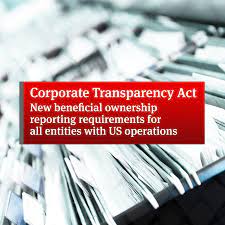 The Financial Crimes Enforcement Network (FinCEN) has issued a final rule implementing the beneficial ownership information reporting provisions under the Corporate Transparency Act (CTA), which was enacted as part of the National Defense Authorization Act for Fiscal Year 2021 (P.L. 116-283). The CTA amended the Bank Secrecy Act by adding a new provision on beneficial ownership reporting (31 USC §5336).
The Financial Crimes Enforcement Network (FinCEN) has issued a final rule implementing the beneficial ownership information reporting provisions under the Corporate Transparency Act (CTA), which was enacted as part of the National Defense Authorization Act for Fiscal Year 2021 (P.L. 116-283). The CTA amended the Bank Secrecy Act by adding a new provision on beneficial ownership reporting (31 USC §5336).
The rule is intended to:
- enhance the ability of FinCEN and other agencies to protect U.S. national security and the U.S. financial system from illicit use; and
- provide essential information to national security, intelligence, and law enforcement agencies, state, local, and tribal officials, and financial institutions, to help prevent illicit actors from laundering or hiding money and other assets in the United States.
The rule requires reporting companies to file reports with FinCEN that identify the beneficial owners of the entity and the entity’s company applicants. The rule also describes who must file a report, what information must be reported, and when a report is due.
Reporting Companies
There are two types of reporting companies: domestic and foreign. A domestic reporting company is a corporation, limited liability company (LLC), or any entity created by filing a document with a secretary of state or any similar office under state or tribal law. A foreign reporting company is an entity formed under the law of a foreign country that is registered to do business in a state or tribal jurisdiction by filing a document with a secretary of state or any similar office.
FinCEN expects limited liability partnerships, limited liability limited partnerships, business trusts, and most limited partnerships to be reporting companies. FinCEN also expects companies with simple management and ownership structures to be the majority of reporting companies.
Twenty-three types of entities are exempt from “reporting company” treatment, including certain governmental authorities, tax-exempt organizations, banks, broker or dealers, investment companies, insurance companies, accounting firms, and others.
An entity that is a “large operating company” is not a reporting company if it:
- employs more than 20 full time employees in the United States;
- has an operating presence at a physical office within the United States; and
- filed a federal income tax or information return in the United States for the previous year demonstrating over $5,000,000 in gross receipts or sales (excluding gross receipts or sales from sources outside the United States).
Other legal entities, including certain trusts, are also excluded to the extent that they are not created by filing a document with a secretary of state or similar office.
Beneficial Owners
A beneficial owner includes any individual who, directly or indirectly, either (1) exercises substantial control over a reporting company, or (2) owns or controls at least 25 percent of the ownership interests of a reporting company. The rule defines “substantial control” and “ownership interest.”
A beneficial owner does not include a minor child; an individual acting as a nominee, intermediary, custodian, or agent on behalf of another individual; a reporting company employee (but not a senior officer) whose substantial control over or economic benefits from the entity are derived solely from his or her employment status; an individual whose only interest in a reporting company is a future interest through right of inheritance; or a creditor of a reporting company.
Company Applicants
A company applicant is: (1) the individual who directly files the document that creates the entity (for a foreign reporting company, the document that first registers the entity to do business in the United States); and (2) the individual who is primarily responsible for directing or controlling the filing of the relevant document by another.
Reporting companies existing or registered on the effective date of the rule are not required to identify and report on their company applicants. Reporting companies formed or registered after the effective date must report company applicant information but do not need to update it.
Beneficial Ownership Information Reports
In the report filed with FinCEN, a reporting company must identify itself and report four pieces of information about each of its beneficial owners: name, birth date, address, and a unique identifying number and issuing jurisdiction from an acceptable identification document (and the image of that document). Reporting companies created after January 1, 2024, must also provide this information and document image for company applicants.
An individual who provides his or her information to FinCEN directly can obtain a unique identifying number assigned by FinCEN (“FinCEN identifier") which can then be provided to FinCEN on a report instead of the required information about the individual.
Effective Date and Reporting Deadlines
The rule is effective January 1, 2024. Reporting companies created or registered before the effective date have until January 1, 2025, to file their initial reports. Reporting companies created or registered after the effective date have 30 days after receiving notice of their creation or registration to file their initial reports.
A reporting company has 30 days to report changes to the information in its previously filed reports. It also must correct inaccurate information in previously filed reports within 30 days of when it becomes aware or has reason to know of the inaccuracy.
FinCEN has provided a fact sheet which summarizes the new rule.
Have an IRS Tax Problem?

Contact the Tax Lawyers at
Marini & Associates, P.A.

for a FREE Tax HELP Contact us at:
www.TaxAid.com or www.OVDPLaw.com
or Toll Free at 888 8TAXAID (888-882-9243)
 itional IRS customer service voice bot features have been rolled out ahead of schedule, according to an IRS official, who touted the agency’s foray into artificial intelligence.
itional IRS customer service voice bot features have been rolled out ahead of schedule, according to an IRS official, who touted the agency’s foray into artificial intelligence. Darren Guillot, deputy commissioner of collection and operations support in the IRS' Small Business/Self Employed Division, told an audience at a July tax event that the voice bots would be programmed before the end of 2022 to handle a wider range of inquiries. This includes account transcript requests and accessing payment histories and current balances owed.
Darren Guillot, deputy commissioner of collection and operations support in the IRS' Small Business/Self Employed Division, told an audience at a July tax event that the voice bots would be programmed before the end of 2022 to handle a wider range of inquiries. This includes account transcript requests and accessing payment histories and current balances owed.








